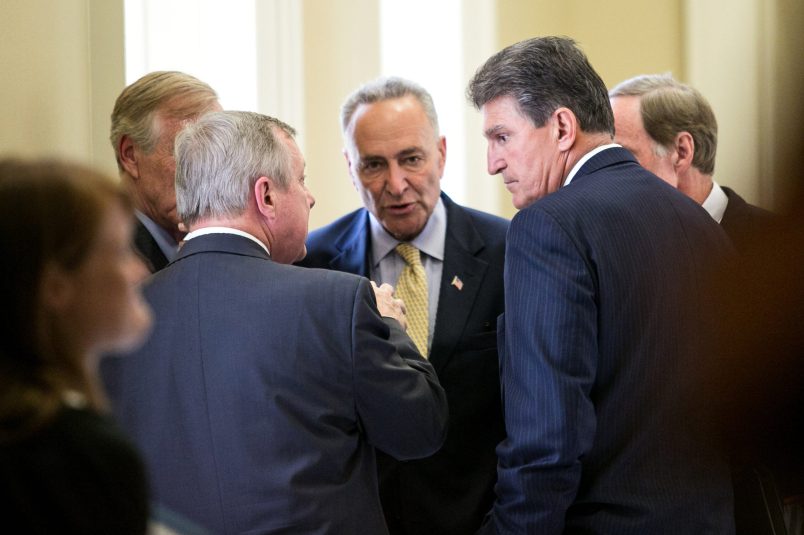Though it’s a galling reality to the vast majority of the Democratic caucus, Sens. Joe Manchin (D-WV) and Kyrsten Sinema (D-AZ) will force the $3.5 trillion dollar reconciliation price tag to come down significantly.
Based on estimates coming out of the White House, the package will fall to the neighborhood of $1.9 trillion to $2.2 trillion.
That’s a lot of money to cut with few palatable ways to do it. Many Senate Democrats abhor the idea of cutting programs wholesale — when asked, they respond incredulously that between childcare, climate provisions and health care expansions, what could you possibly afford to lose?
But there is an option that many Democrats suggested this week they could hold their noses and accept: shortening the duration of programs contained in the reconciliation package to lower the overall cost. When the programs expire earlier than they otherwise would have, the hope goes, the benefits people have received will be so popular that it’ll be politically impossible not to reauthorize them.
“That’s a live discussion,” Sen. Brian Schatz (D-HI) told TPM. “I think everyone’s gonna need to compromise. The composition of that compromise remains to be negotiated, but that’s certainly one way to bring the cost down.”
Unlike the contortions Democrats are usually forced to pull to govern through the reconciliation process, there don’t seem to be significant procedural hurdles attached to this idea. Experts told TPM that there’s no minimum requirement to how long a program passed through reconciliation must last.
Usually, measures like the Bush or Trump tax cuts are purposefully set to expire just before 10 years of duration, so as to not run afoul of the Byrd Rule, which prohibits deficit increases after a decade. But running the programs for a shorter period is permissible too.
“As long as adjustments made fall within the parameters of the reconciliation instructions in the budget resolution, I don’t think it would present procedural difficulties,” Rich Arenberg, director of Brown University’s Taubman Center for Politics and Policy, told TPM.
And Democrats could use political techniques that Republicans have made use of in the past with those two sets of tax cuts. Matt Glassman, a senior fellow at Georgetown’s Government Affairs Institute, pointed to bills introduced just a couple years into the Bush tax cuts to box lawmakers into reauthorizing them, or risk getting slammed for voting for a massive tax increase.
“That’s also true of a benefit,” he told TPM. “If benefit x for seniors is going to expire, it’s very hard to vote against reauthorizing it.”
While the idea produces fewer grimaces from Democratic lawmakers than the notion of cutting programs altogether, it’s not without its drawbacks. Some programs — such as those that deal with reducing climate change-causing emissions — require investment or other flavors of voluntary buy-in, a harder sell if the program’s future and longevity is uncertain.
“The commercial sector needs to know that the need is going to be there in order to make the capital investments,” Sen. Tammy Duckworth (D-IL) told TPM. “We saw that problem with wind and solar, where we were reauthorizing the credits every two years and it really didn’t give any incentive to the commercial sectors to make the investments that needed to be made.”
If investors know that they can count on a program for five or 10 years, she added, they’re much more comfortable providing funding.
Sen. Bob Casey (D-PA) brought up a similar concern with his pet issue, home and community-based services, which let Medicaid beneficiaries receive services in their own homes rather than in an institution. The proposal offers additional federal Medicaid matching funds to states that participate and meet the requirements.
“The time duration matters a lot,” Casey told TPM. “It’s an effort to provide Medicaid dollars, matching dollars, that the states have to embrace. They’re not going to embrace it if it isn’t long enough.”
And of course, all problems lead back to Sinema and Manchin. It’s hard to know how this idea will affect programs when Democrats still don’t know which ones those two will end up opposing.
“I still don’t know exactly what programmatic areas the two friends are against or for so that we can actually get down to coming up with a compromise,” Sen. Mazie Hirono (D-HI) told TPM.
The sausage-making will never be pretty in a party where some lawmakers opened the negotiations with a bid for a $10 trillion package and one countered with $1.5 trillion. But in a cornucopia of bad choices, this is one that even the party’s stalwart progressives are keeping on the table.



